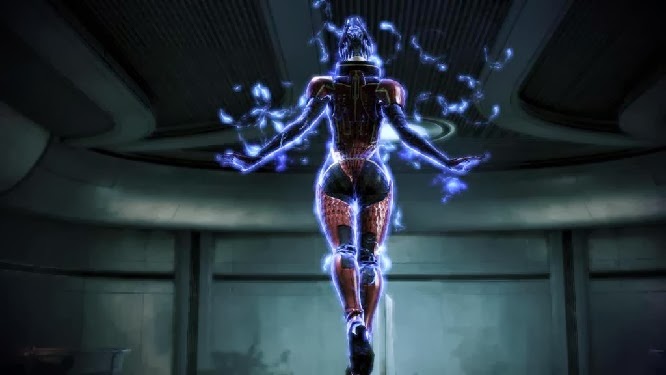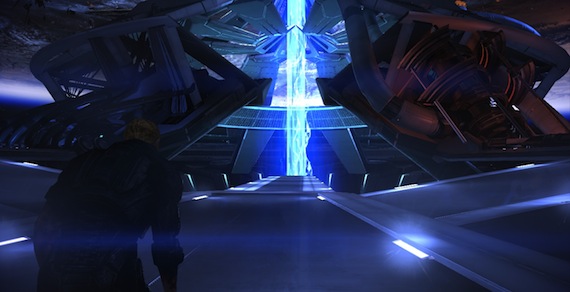Mass Effect 3, Or, How I Learned To Stop Worrying And Love The Ending
Mass Effect 3‘s ending was actually good. Fight me.
(Spoilers ahead! Also, go play the game already.)
Have you ever experienced feeling so ridiculously giddy and amazed and happy about something that you love, only to find out that most of the rest of the world craps on that exact same thing?
If the answer is yes, then congratulations: you’ve met the Internet.
This is the exact same experience that I had with the gaming world vis-a-vis the much-maligned last ten to fifteen minutes of Mass Effect 3. I heard a lot of people say it was the ending that betrayed the core of what the Mass Effect series had stood for, in stark contrast to the majority of its contemporaries and even predecessors. This “core” is supposedly Choice – or, to be more precise, the impact that gameplay choices make, both in gameplay and narrative terms. I am here, though, to argue that that is in fact not the core virtue of the Mass Effect series. Its core virtue is (heh) stellar storytelling. And that is why the ending, Extended Version or no, was the perfect capper for the series as a whole.
I started playing Mass Effect six years ago, during my thesis year in college, and I’m not gonna lie, I think I went through the in-game Codex more times than I went through Immanuel Kant. I fell in love with the game’s lore and story and, heck, pretty much everything that didn’t have to do anything with the actual point-and-shoot and role-playing gameplay mechanics, almost at first sight. By the end of my first week playing the game, I could remember the in-universe explanations for faster-than-light travel better than I could remember what the three formulations of the categorical imperative were. I guess my point here is that, beyond gameplay that admittedly needed improvement, the game’s strength really did appear to be good story hooks.
I say “hooks” because if you boiled the Mass Effect series’ story down to its sci-fi essentials, you would see that there is nothing particularly new. Christ-like savior figure? Check. Intergalactic politics? Check. Space babes? You bet your blue Asari ass that’s a check.

But what the Mass Effect series lacks in true originality, it makes up for in sheer, unadulterated lore-building. And it isn’t limited to just the Codex, either. One of the things I loved about this game is that it rewards you for actually taking the time to read the infodump, not in a gameplay sense, but in a storytelling sense. You could go through the game without it, true, but why wouldn’t you want to read about human naval warfare tactics writ galaxy-large, or about how slugs fired from a railgun in space will never stop until it hits something?
If you were the type of gamer who really wanted to squeeze every last bit of enjoyment from their game (and not in an achievement-hunting sense, not that this series didn’t also provide for that), Mass Effect had you covered. It’s one thing to read about something that you might find cool now but then forget later; it’s another to actually have a random encounter with characters (like the ones in that video up there; still one of my favorite ME moments) that really make you feel the in-universe scope and gravity of the information you now have. It doesn’t necessarily help you play the game, but it helps you understand what the game’s story is trying to tell you.
The point I’m trying to make here is that Bioware didn’t just do a really good job building this universe. They also did an excellent job setting it in motion. The team behind Mass Effect populated the world with characters that you’d care for, planets you’d want to save, planets you’d hate to save, guns and ships or kind words and tacit pressure to do those with. No part of that, however, meant that the game ceded the overall control of how the plot would unravel to the player. Mass Effect is trying to tell you a story. Granted, it’s an interactive one, and yes, you do have a set of choices that would alter certain things about how the story turns out, but if anything, those choices were window-dressing all along. And much the same way you’d probably not want to match frilly pink curtains with your richly appointed log cabin, you’d care about the choices that you make, but you’d know that these choices would be superficial, at best.
“Whoa, hold up, wait a minute, you mean the decision to kill off the REDACTED was window-dressing? Fie to you, sir, fie!”, you might say, if you lived in the 19th century and somehow played this game. But see, person-out-of-time, that choice ultimately doesn’t matter in the long run. One way or another, the Reapers were gonna go down. One way or another, the game was going to end. And this is why knowing enough of the game’s lore is important to one’s understanding and acceptance of the way the ending went down. Mass Effect built a narrative buttressed not by the player’s choices, but by the writing and the lore inherent in the game. Because it is trying to tell a story, and a good one at that, there had to be certain constraints still. No game can be so open-ended as to take all of the possible choices that a player might make and churn out an ending appropriate to every single one. Not yet, anyway.
I have always told my friends (those that can sit still long enough to listen to me preach about this series, anyway) that it felt to me like Mass Effect was actually a novel that you can poke and prod. I mean, look, all the literary elements are already there. This series lends itself extremely well to novelization precisely because of that. When you have a world as detailed and characters as colorful as Mass Effect does, you only really need a plot and a kick in the right direction. It does mean, though, that certain somethings have to be sacrificed at the altar of storytelling. As in any other literary medium, this means goodbye choice, hello close reading. Or playing, as it were.

A cursory Google search about Mass Effect 3‘s ending will net you a staggering amount of negativity. Variations on statements such as “the ending is insulting to Mass Effect fans” and “Bioware has betrayed us” are commonplace. The most common argument bandied about by these fellows is the “how can you not take my choices into account in the ending?” argument. Which, like I have been harping about since the beginning of this piece, is a fine argument, if you’re an idiot. Or you play Call of Duty games for the story, but hey, no judgment.
See, if you paid close enough attention to the plot, you’d understand the sheer magnitude of what your characters had to face in order to save the galaxy. Everyone and their mother told Commander Shepard the task felt like one that was too big for any of them, or all of them. The player is steadily and repeatedly groomed to accept possible failure. Which is why it does not make sense for the player to then complain when it takes an almost literal deus ex machina to resolve the plot. If one was an attentive gamer (by which I mean the kind of gamer who actually listens in on random NPC conversations, not the one that compulsively hoards allies to cobble a fleet together), you’d gain an appreciation for what lies ahead of you, an exhilaration at the tiniest of victories, and a sense of actual relief that things worked out pretty much okay for the galaxy no matter what road you chose.
This is what I think is the problem with the clamorous, anti-ending part of the Mass Effect fanbase: they conflate their feelings for how the story turned out with their feelings about how the game should have allowed their version of the ending to happen. The clamor for choice having more bearing than it already does in the game is directly tied to how many of these players didn’t like the way the story ended. How many of these players, do you think, would be clamoring so hard for their decisions to carry more weight if the ending didn’t feature the Star-Child? I hesitate to say that a fanbase is entitled because to a certain extent, entitlement is justified (after all, you did pay for the game, didn’t you?), but it strikes me as the height of disingenuity to claim something is bad because of a decision that, had they actually stopped to really think about it, wasn’t really in their hands anyway.
I felt bad for the creative team behind Mass Effect when this brouhaha came out. I suspect I only feel this way because I saw absolutely no problem with the ending, but even if I did, I wouldn’t say that the game or its developers betrayed me in any way. If ever, I would have said “damn, that was a good story, kinda didn’t like how it ended but pretty cool, huh?” My final thought is one that only now strikes me, but I suppose is as good a way to close this defense of the game as any: If someone’s thoughts about the game was “DAMMIT BIOWARE I WANTED MY ENDING THIS GAME IS SH*T NOW” then that person probably wasn’t a real fan in the first place.
All photos c/o Bioware




